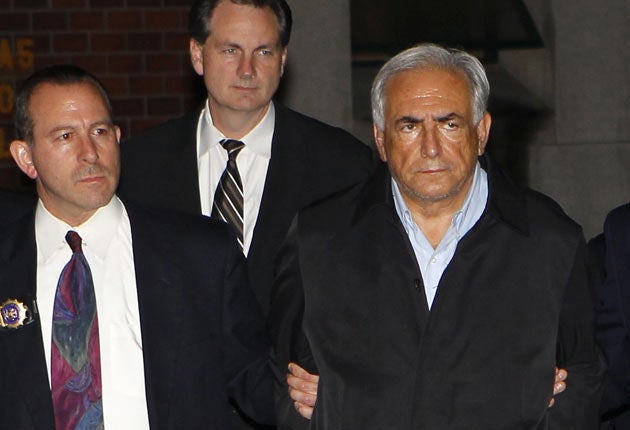Dominique Strauss-Kahn maid gives her side of the story to grand jury

Your support helps us to tell the story
From reproductive rights to climate change to Big Tech, The Independent is on the ground when the story is developing. Whether it's investigating the financials of Elon Musk's pro-Trump PAC or producing our latest documentary, 'The A Word', which shines a light on the American women fighting for reproductive rights, we know how important it is to parse out the facts from the messaging.
At such a critical moment in US history, we need reporters on the ground. Your donation allows us to keep sending journalists to speak to both sides of the story.
The Independent is trusted by Americans across the entire political spectrum. And unlike many other quality news outlets, we choose not to lock Americans out of our reporting and analysis with paywalls. We believe quality journalism should be available to everyone, paid for by those who can afford it.
Your support makes all the difference.The hotel maid who has accused Dominique Strauss-Kahn of attempted rape was due to testify before a grand jury behind closed doors last night, as her lawyers dismissed any notion that she consented to sexual contact with the head of the International Monetary Fund (IMF) in the penthouse suite of New York's Sofitel Hotel.
Prosecutors and defence lawyers were scrambling to prepare for a second court hearing tomorrow that may set bail for the former French finance minister. But for now, Mr Strauss-Kahn remains under suicide watch in his solitary cell at New York City's spartan Rikers Island jail complex.
The victim of the alleged assault is reportedly from West Africa and was given asylum in the US seven years ago. Her lawyers dismissed suggestions that she played a role in plot to entrap Mr Strauss-Kahn, who had been seen as a leading contender in next year's French presidential election.
Prosecutors were expected to press yesterday's grand jury to offer up formal charges or an indictment to be read to the 62-year-old defendant when he appears at Manhattan Criminal Court tomorrow. Without an indictment, holding Mr Strauss-Kahn in custody any longer would be hard to justify. The seven charges would include forceful imprisonment and attempted rape. If he is found guilty of the most serious count, he could face 25 years behind bars.
Yesterday, there was an unsympathetic response from the Mayor of New York City, Michael Bloomberg, to complaints from France that Mr Strauss-Kahn was unfairly paraded before the media when he was shown walking out of a police station in handcuffs – the so-called "perp walk".
"I think it is humiliating, but if you don't want to do the perp walk, don't do the crime," Mr Bloomberg said. He also made clear that he supported a judge's ruling on Monday that Mr Strauss-Kahn should be denied bail. "He would be the kind of person who has a good chance of fleeing and France does not have an extradition treaty with the United States," he said.
Until days ago, Mr Bloomberg and Mr Strauss-Kahn belonged to the same club of globetrotting masters of world affairs. Now the defendant watches from his cell as, one by one, erstwhile peers urge him to surrender the title that accorded him so much respect. The US Treasury Secretary, Tim Geithner, said the Frenchman was "obviously not in a position to run the IMF".
It is likely to be at least six months before the case comes to trial, which maked securing bail a priority for the defence team. The case of the film director Roman Polanski, who evaded sexual abuse charges in California by fleeing to France, may be colouring the thinking of US officials in this case.
Yet for many legal experts the allegations do not rise to the level of long-term bail denial. "In general, it is not reasonable to set no bail for somebody who is charged with a first-offence Class B felony who has a substantial amount of bail to post," said Richard Willstatter, the president-elect of the New York State Association of Criminal Defence Lawyers. "It is almost inevitable that bail will be set."
Jeffrey Shapiro, a lawyer for the alleged victim, denied that she had willingly entered into sexual relations with Mr Strauss-Kahn, and said she only discovered his identity the day after the alleged incident. "There was nothing consensual about what took place in that hotel room," he told NBC News. "This is a woman who is a rape victim – the victim of a physical assault – who since this has taken place and since she has reported it to security at the hotel, has not had a moment of peace. She has not been able to return home. She has not been able to seek any help."
It emerged that the alleged victim was escorted back to room 2806 in the Sofitel on Monday to help investigators find possible physical evidence.
Key questions
Where was Dominique Strauss-Kahn at the time of the alleged attack?
His French lawyers initially claimed he was having lunch with his daughter, but prosecutors have highlighted discrepancies in the timing of the alleged incident and the meeting.
Did he imprison his alleged victim in room 2806 at the Sofitel?
His room key card may be useful as evidence. If, as the victim alleges, the door was locked while she was attacked, there should be an electronic record of that. It is standard procedure in most hotels for maids to leave the door open or ajar when they are in a room.
Did the IMF chief flee the scene?
Lawyers dispute claims that Mr Strauss-Kahn fled the hotel to escape New York by aeroplane, but police say evidence left behind at the Sofitel suggests that he "got out of there in a hurry".
Join our commenting forum
Join thought-provoking conversations, follow other Independent readers and see their replies
Comments